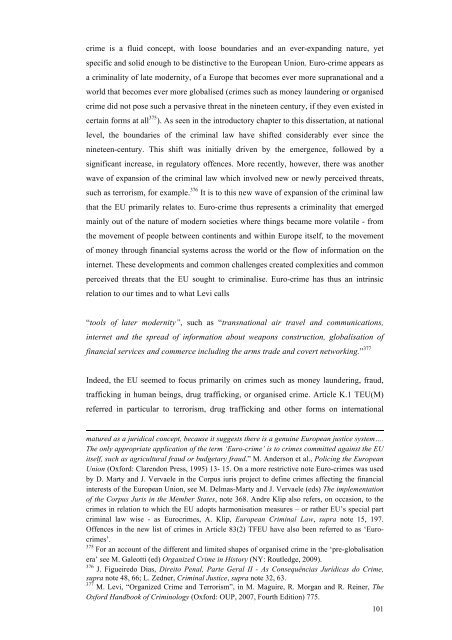The evolution of European Union criminal law (1957-2012)
The evolution of European Union criminal law (1957-2012)
The evolution of European Union criminal law (1957-2012)
You also want an ePaper? Increase the reach of your titles
YUMPU automatically turns print PDFs into web optimized ePapers that Google loves.
crime is a fluid concept, with loose boundaries and an ever-expanding nature, yet<br />
specific and solid enough to be distinctive to the <strong>European</strong> <strong>Union</strong>. Euro-crime appears as<br />
a <strong>criminal</strong>ity <strong>of</strong> late modernity, <strong>of</strong> a Europe that becomes ever more supranational and a<br />
world that becomes ever more globalised (crimes such as money laundering or organised<br />
crime did not pose such a pervasive threat in the nineteen century, if they even existed in<br />
certain forms at all 375 ). As seen in the introductory chapter to this dissertation, at national<br />
level, the boundaries <strong>of</strong> the <strong>criminal</strong> <strong>law</strong> have shifted considerably ever since the<br />
nineteen-century. This shift was initially driven by the emergence, followed by a<br />
significant increase, in regulatory <strong>of</strong>fences. More recently, however, there was another<br />
wave <strong>of</strong> expansion <strong>of</strong> the <strong>criminal</strong> <strong>law</strong> which involved new or newly perceived threats,<br />
such as terrorism, for example. 376 It is to this new wave <strong>of</strong> expansion <strong>of</strong> the <strong>criminal</strong> <strong>law</strong><br />
that the EU primarily relates to. Euro-crime thus represents a <strong>criminal</strong>ity that emerged<br />
mainly out <strong>of</strong> the nature <strong>of</strong> modern societies where things became more volatile - from<br />
the movement <strong>of</strong> people between continents and within Europe itself, to the movement<br />
<strong>of</strong> money through financial systems across the world or the flow <strong>of</strong> information on the<br />
internet. <strong>The</strong>se developments and common challenges created complexities and common<br />
perceived threats that the EU sought to <strong>criminal</strong>ise. Euro-crime has thus an intrinsic<br />
relation to our times and to what Levi calls<br />
“tools <strong>of</strong> later modernity”, such as “transnational air travel and communications,<br />
internet and the spread <strong>of</strong> information about weapons construction, globalisation <strong>of</strong><br />
financial services and commerce including the arms trade and covert networking.” 377<br />
Indeed, the EU seemed to focus primarily on crimes such as money laundering, fraud,<br />
trafficking in human beings, drug trafficking, or organised crime. Article K.1 TEU(M)<br />
referred in particular to terrorism, drug trafficking and other forms on international<br />
matured as a juridical concept, because it suggests there is a genuine <strong>European</strong> justice system….<br />
<strong>The</strong> only appropriate application <strong>of</strong> the term ‘Euro-crime’ is to crimes committed against the EU<br />
itself, such as agricultural fraud or budgetary fraud.” M. Anderson et al., Policing the <strong>European</strong><br />
<strong>Union</strong> (Oxford: Clarendon Press, 1995) 13- 15. On a more restrictive note Euro-crimes was used<br />
by D. Marty and J. Vervaele in the Corpus iuris project to define crimes affecting the financial<br />
interests <strong>of</strong> the <strong>European</strong> <strong>Union</strong>, see M. Delmas-Marty and J. Vervaele (eds) <strong>The</strong> implementation<br />
<strong>of</strong> the Corpus Juris in the Member States, note 368. Andre Klip also refers, on occasion, to the<br />
crimes in relation to which the EU adopts harmonisation measures – or rather EU’s special part<br />
<strong>criminal</strong> <strong>law</strong> wise - as Eurocrimes, A. Klip, <strong>European</strong> Criminal Law, supra note 15, 197.<br />
Offences in the new list <strong>of</strong> crimes in Article 83(2) TFEU have also been referred to as ‘Eurocrimes’.<br />
375 For an account <strong>of</strong> the different and limited shapes <strong>of</strong> organised crime in the ‘pre-globalisation<br />
era’ see M. Galeotti (ed) Organized Crime in History (NY: Routledge, 2009).<br />
376 J. Figueiredo Dias, Direito Penal, Parte Geral II - As Consequências Jurídicas do Crime,<br />
supra note 48, 66; L. Zedner, Criminal Justice, supra note 32, 63.<br />
377 M. Levi, “Organized Crime and Terrorism”, in M. Maguire, R. Morgan and R. Reiner, <strong>The</strong><br />
Oxford Handbook <strong>of</strong> Criminology (Oxford: OUP, 2007, Fourth Edition) 775.<br />
101
















